GREEN 33 Vegetables, Fruits, Superfoods Ingredients
\n \n \n \n \n \n \n \n \n \n \n \n \n \n \n \n \n \n \n \n \n \n \n \n \n \n \n \n \n \n \n \n \n \n \n \n \n \n \n \n \n \n \n \n \n \n \n \n \n \n \n \n \n \n \n \n \n \n \n \n \n \n \n \n \n \n \n \n \n \n \n \n \n \n \n \n \n \n \n \n \n \n \n \n \n \n \n \n \n \n \n \n \n \n \n \n \n \n \n \n \n \n \n \n \n \n \n \n \n \n \n \n \n \n \n \n \n \n \n \n \n \n \n \n \n \n \n \n \n \n \n \n |
Alfalfa \nWe have chosen these ingredients not just for there nutritional value and importance but also for their synergy as a co-operative formula. Alfalfa is a rich natural source of chlorophyll, vitamins, minerals and protein which supports a healthy colon. |
 |
Aloe Vera \nThe benefits of Aloe Vera are numerous. It produces more than six natural antiseptics, which are able to kill mold, bacteria, fungi, and virii. The plant is so powerful that researchers are examining its potential as an AIDS and cancer-fighter. Besides it's skin healing properties, it also aids digestion and elimination, relieves gastrointestinal disorders, lowers blood glucose, improves heart function, and may even lower bad cholesterol and triglycerides. |
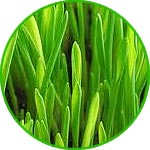 |
Barley Grass \nBarley grass contains a broad spectrum of vitamins, minerals, enzymes, protein, and chlorophyllins. It provides eleven times the calcium of cow's milk and five times the iron of spinach. Research on barley grass shows encouraging results in DNA damage repair and anti-aging activity. |
 |
Beet (root) \nThe part of the plant used medicinally is the root. Beets help normalize the ph of the body, and they also help build the blood. Primary chemical constituents of beet root include saponiside, phytosterol, betaine, leucine, tyrosine, betacyanin, beta carotene, manganese, potassium, and iron. Beet root has a general stimulant and resistance-enhancing action. This is based on the red pigment "betanin", an anthrocyanin from the flavonoid group. |
 |
Bilberry Leaf \nThe dried berries and leaves of bilberry have been recommended for a wide variety of conditions, including scurvy, urinary tract infections, and kidney stones. Perhaps the soundest historical application is the use of the dried berries to treat diarrhea. Modern research of bilberry was partly based on its use by British World War II pilots, who noticed that their night vision improved when they ate bilberry jam prior to night bombing raids. |
 |
Broccoli \nBroccoli is rich in fiber, carotenoids, and vitamin A, vitamin C and vitamin K.It is a powerful antioxidant that is believed to prevent damage to cells caused by free radicals. The high fiber content of Broccoli means diabetics should certainly consider broccoli as an important dietary choice. Broccoli also has as much calcium as milk, and is therefore an important source of nutrition for those with osteoporosis or calcium deficiencies. |
 |
Cabbage \nCabbage is an excellent source of vitamin C. It also contains significant amounts of glutamine, an amino acid that has anti-inflammatory properties. Cabbage can also be included in dieting programs, as it is a low calorie food and is packed with fiber. It is a source of indole-3-carbinol, a chemical which boosts DNA repair in cells. |
 |
Carrot \nVery nutritious, carrots provide the highest content of vitamin A. They contain the natural bioactive compounds found in plant foods, carotenoids and flavonoids, two very important phytochemicals. |
 |
Celery \nIn ancient Rome, Celery was worn around the neck to ward off a hangover from a particularly hardy night of partying. Perhaps this is where the practice of putting a stalk of celery in a Bloody Mary began. Celery has been used in Asia as a treatment for high blood pressure for centuries. Celery is high in fiber and also contains phenolic acids, which show efficacy in blocking the harmful actions of prostoglandins. |
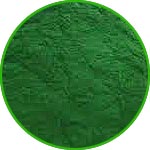 |
Chlorella \nChlorella contains a higher concentration of chlorophyll than any other cultivated plant. The cell wall material of chlorophyll aids in detoxifying the colon and promoting growth of beneficial bacteria. It also helps eliminate heavy metals and helps maintain muscle tone during times of decreased food intake. Chlorella contains a combination of molecules called "controlled growth factors" which provide an increase in energy and immune health when taken regularly. |
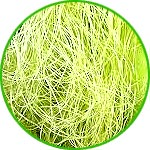 |
Cornsilk \nCornsilk is traditionally used to soothe the urinary tract and can give relief to the bladder, kidneys and small intestine. Rich in fiber, it is excellent as an aid for digestion and elimination. |
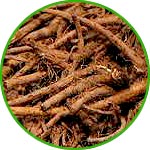 |
Dandelion Root \nDandelion Root can be helpful in maintaining healthy kidney and liver function, and may also have blood cleansing effects. |
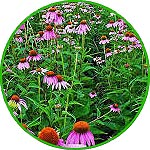 |
Echinacea Purpurea \nEchinacea increases the "non-specific" activity of the immune system. In other words, unlike a vaccine which is active only against a specific disease, echinacea stimulates the overall activity of the cells responsible for fighting all kinds of infection. Unlike antibiotics, which are directly lethal to bacteria, echinacea makes our own immune cells more efficient in attacking bacteria, viruses and abnormal cells, including cancer cells. |
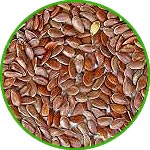 |
Flax Seed \nFull of soluble fiber and dense nutrients, flax is almost a perfect food. It is believed to reduce your risk of heart disease, cancer, stroke, and diabetes. Besides being a rich source of fiber, it also contains heart-healthy omega-3s essential fatty acids, and up to 800 times more lignans (which have both plant estrogen and antioxidant qualities) than other plant foods. |
 |
Odorless Garlic (Allium sativum) \nGarlic is well studied as an anti-viral and anti-biotic, having been used by traditional cultures for 100s of years to fight infections and boost immune systems.In vitrostudies proved garlic to have antibacterial, antiviral, and antifungal activity. Research shows a whole host of benefits, especially as an anti-oxidant. Consuming garlic was found to keep cholesterol deposits from accumulating in walls of blood vessels and participants in a study taking 300mg per day of garlic powder were found to have more elastic arteries and lower blood pressure. In 2007, the BBC (Grieve, Maud. Garlic. A Modern Herbal. Hypertext version of the 1931 edition) reportedgarlic may prevent and fight the common cold. This assertion has the backing of long tradition in herbal medicine, which has long used garlic for colds and coughs. |
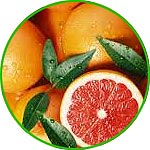 |
Grapefruit (Pectin) \nPectin is a soluble fiber. Researchers at the University of California, Davis, found that pectin acts as an antioxidant against the damaging portion of cholesterol in the blood stream. Pectin tends to increase acidity in the large intestines, and is advocated for those suffering from ulcer or colitis, and for regulating blood pressure. |
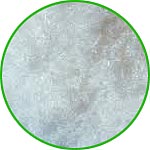 |
MSM(Methylsulfonylmethane): \n* helps our bodies absorb more nutrients (vitamins and minerals). \n* increases oxygen availability to the body. \n* increases energy. \n* helps the body eliminate toxins including lactic acid build-up from strenuous exercise. \n* reduces recuperation time from strenuous exercise and long hours of work. \n* helps reduce inflammation due to injury or inflammatory diseases such as arthritis. \n* together with Vitamin C (a free radical scavenger) helps the body build healthy new cells. \n* helps relieve constipation. |
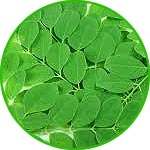 |
Moringa \nMoringa has been used for 1000s of years by traditional cultures for ailments ranging from gout to colds, diarrhea, various inflammations and fevers. It has one of the densest nutrient values of any plant,with a full range of fiber, minerals, protein, vitamins, beta-carotene, amino acids and various phenolics. The Moringa plant provides a rich and rare combination of zeatin, quercetin, beta-sitosterol, caffeoylquinic acid and kaempferol. |
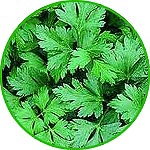 |
Parsley \nParsley contains vitamins B, C and E and minerals iron, calcium, manganese, phosphorus and potassium. Parsley has the perfect balance of iron and vitamin C. Vitamin C is needed to increase the uptake of iron. Parsley is also good for intestinal colic and flatulence. |
 |
Pau d'Arco \nResearchers have detected in the inner bark of the Tabebuia trees a handful of powerful infection-fighting compounds called naphthoquinones. One of these substances (lapachol) seems to be particularly potent. Naphthoquinones appear to help kill certain disease-causing bacteria, viruses, and fungi, partially justifying the name given to this herbal remedy ("tajy," meaning to have strength and vigor) by the Guarani and Tupi tribes in South America. |
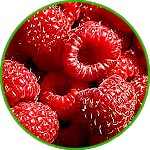 |
Raspberry \nRaspberries contain one of the most powerful known antioxidants, a series of ellagatannins which are converted into ellagic acid in the body. Many fruits contain ellagatannins. However, raspberry ellagatannins are one of very few fruits that have been clinically shown to be transformed into beneficial levels of ellagic acid in the body. |
 |
Rosemary \nRosemary contains a number of potentially biologically active compounds, including antioxidants carnosic acid and rosmarinic acid. Other bioactive compounds include camphor (up to 20% in dry rosemary leaves), caffeic acid, ursolic acid, betulinic acid, rosmaridiphenol and rosmanol. |
 |
Sage \nSage was an old remedy for easing the digestive tract and may stimulate appetite and enhance digestion. |
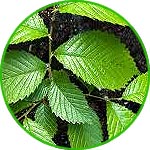 |
Slippery Elm \nSlippery Elm has good food value and is said to soothe the digestive tract (Bile reflux: Alternative medicine ) |
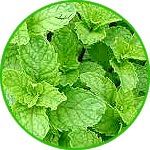 |
Spearmint \nSpearmint's anti-androgenic properties reduce the level of free testosterone in the blood, while leaving total testosterone and DHEA unaffected. It can also be used to treat a variety of digestive ailments, including stomach ache and gas (The Complete Illustrated Book of Herbs, Alex Frampton, The Reader's Digest Association, 2009). Spearmint has been studied for antifungal activity. |
 |
Spinach \nAn excellent source of antioxidants, Spinach has four times the beta carotene of broccoli. High in lutein, it also contains carbohydrates, protein, fiber, vitamin A, vitamin C, calcium, iron and folic acid. |
 |
Spirulina \nSpirulina is a so-called super food. It is considered the most nutritious, concentrated whole food known. It has a rich, vibrant history, and occupies an intriguing biological and ecological niche in the plant kingdom. Spirulina is truly an amazing food, full of nutritional wonders. Spirulinas concentrated nutrition makes it an ideal food supplement for people of all ages and lifestyles. Spirulina is about sixty percent complete, highly digestible protein. Spirulina contains every essential amino acid. It contains more beta-carotene than any other whole food; it is the best whole food source of gamma linolenic acid (GLA); it is rich in B vitamins, minerals, trace elements, chlorophyll, and enzymes; and it is abundant in other valuable nutrients about which scientists are learning more each year, such as carotenoids, sulfolipids, glycolipids, phycocyanin, superoxide dismutase, RNA, and DNA. |
 |
Strawberry \nStrawberries contain a range of nutrients, with vitamin C heading the group. They also contain significant levels of phytonutrients and antioxidants, which fight free radicals. These antioxidant properties are believed to be linked to what makes the strawberry bright red. In addition to vitamin C, strawberries also provide an excellent source of vitamin K and manganese, as well as folic acid, potassium, riboflavin, vitamin B5, vitamin B6, copper, magnesium, and omega-3 fatty acids. |
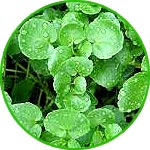 |
Watercress \nWatercress is the one of the most nutritious vegetables known to man Watercress contains significant amounts of iron, calcium and folic acid, in addition to vitamins A and C. |
 |
Wheatgrass \nWheatgrass is another "super food", containing most of the vitamins and minerals needed for human maintenance, with about 30 enzymes and is approximately 70% crude chlorophyll. Wheatgrass is nutritionally dense and provides many health boosting benefits. |
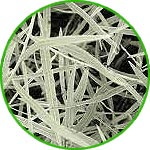 |
White Willow \nWhite Willow eases aches and pains and reduce fevers (Norn, S.; Permin, H.; Kruse, P. R.; Kruse, E. [From willow bark to acetylsalicylic acid] Dansk Medicinhistorisk Arbog; 2009) |
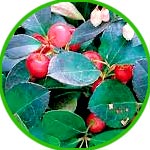 |
Wintergreen \nAnother widely useful botanical that is most often used as an anti-inflammatory. |
\n \n